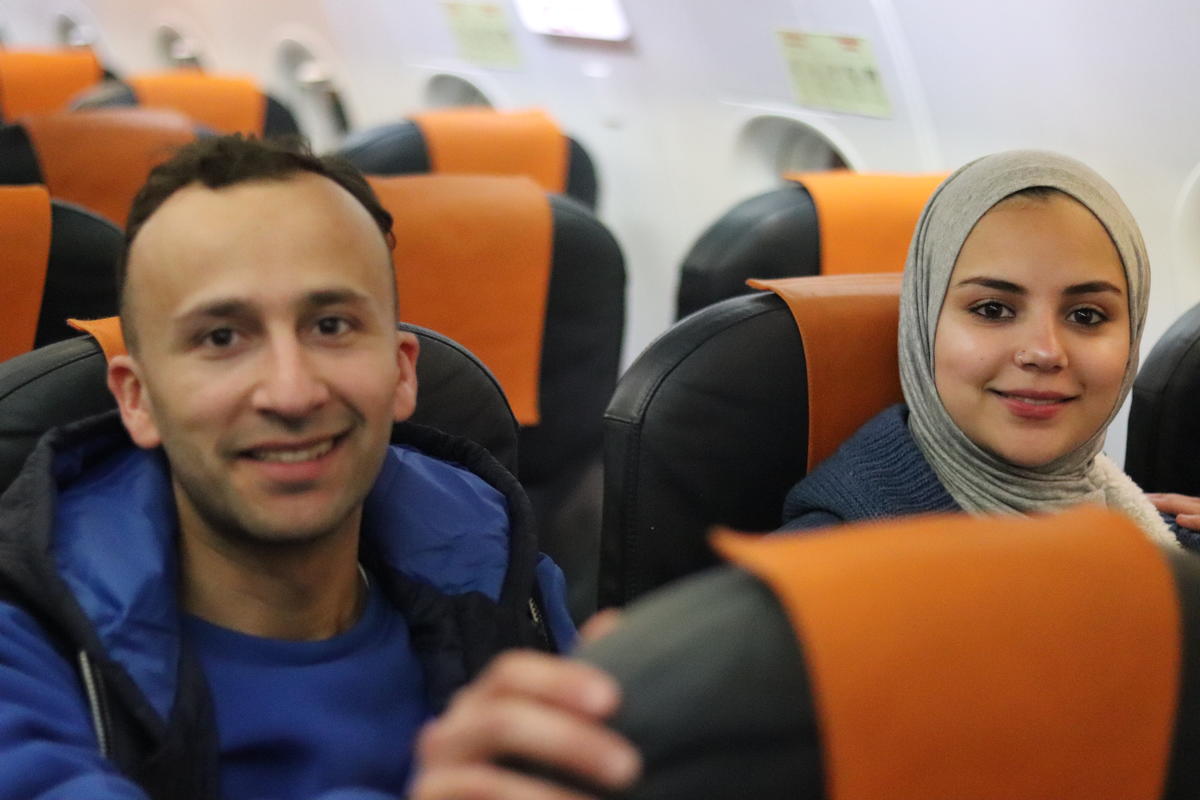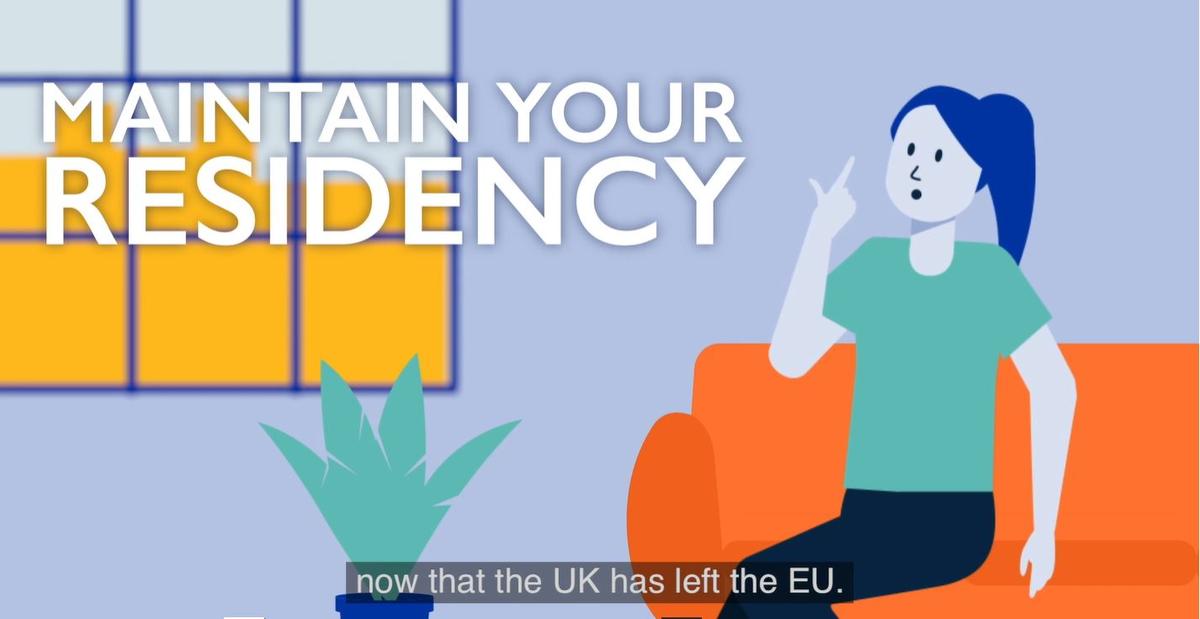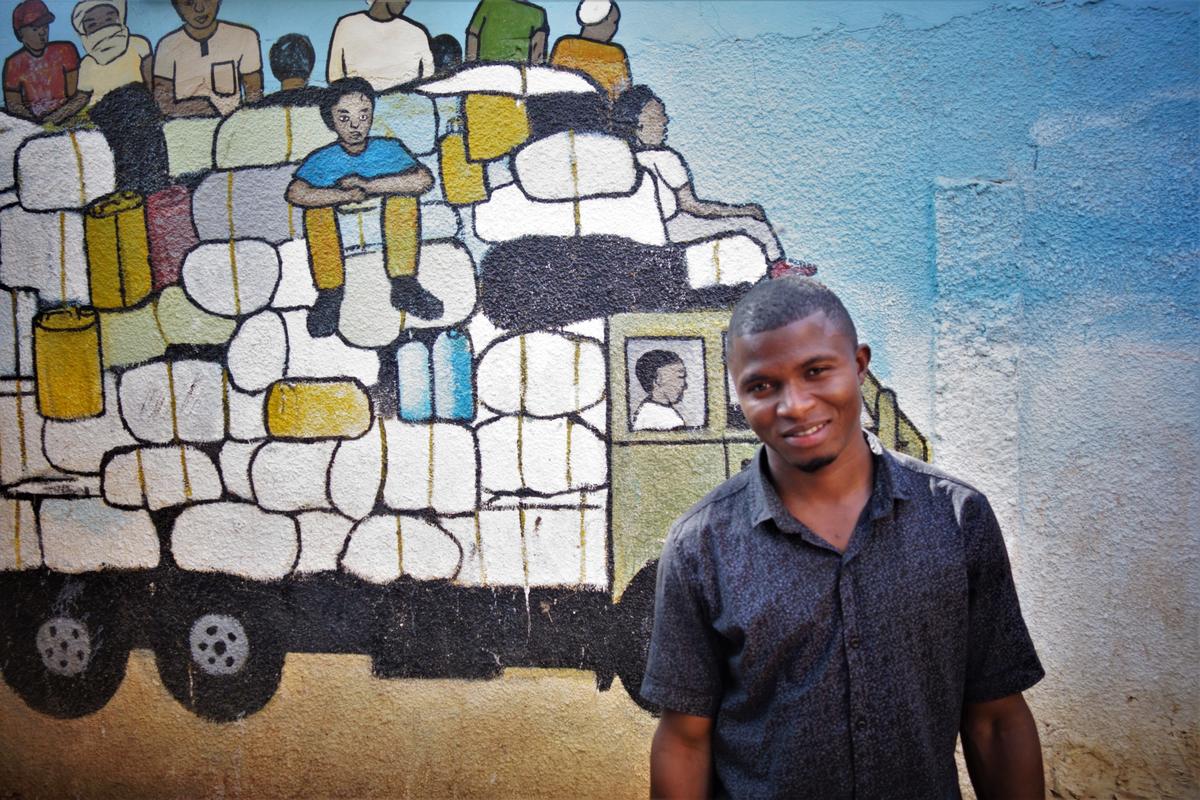-
Who we are
WHO WE AREThe International Organization for Migration (IOM) is part of the United Nations System as the leading inter-governmental organization promoting humane and orderly migration for the benefit of all. IOM has had a presence in the United Kingdom since 1995.
About
About
IOM Global
IOM Global
-
Our Work
Our WorkAs the leading inter-governmental organization promoting humane and orderly migration, IOM plays a key role to support the achievement of the 2030 Agenda through different areas of intervention that connect both humanitarian assistance and sustainable development. In the UK, IOM supports migrants through a variety of resettlement, support and protection activities.
Cross-cutting (Global)
Cross-cutting (Global)
- Data and Resources
- Take Action
- 2030 Agenda
2020 IOM UK Snapshot
IOM advocates and works to help ensure the orderly and humane management of migration and provide humanitarian assistance to migrants in need around the world, including refugees and internally displaced people. In the UK we help migrants and refugees to better integrate, and we assist receiving communities to recognize and support the positive contributions that they can make.
In 2020, in response to the global Covid-19 crisis, IOM UK adapted its programmes and activities to continue providing support to migrants at heightened risk. We also continued to work during this crisis with frontline organisations and staff equipping them with the tools and information to engage with migrant communities.
We have strengthened our global relationships, while also developing the scope of our work and presence in the UK, expanding to new regions and providing direct assistance to migrants. We have partnered with central and local authorities, academia, civil society and other stakeholders to respond to a dynamic migration picture impacted by, among other things, the UK's departure from the EU.
"If we are united, we can make migration work for all"
António Guterres, UN-Secretary General
Resettlement

We play key a role in the resettlement of refugees to the UK, providing individuals and families with pre-departure and travel assistance, including health assessments, provision of travel documents and visas, pre-departure orientation and operational and medical escorts, before refugees are helped to settle in communities across the country by local authorities and NGOs
Despite the huge impact that COVID-19 has had on human mobility and the resettlement of refugees, our work in 2020 and the previous years contributed to the recent achievement of the UK's target of resettling 20,000 refugees escaping from the conflict in Syria through the Vulnerable Persons Resettlement Scheme.
In 2020, in partnership with the British Red Cross, a total of 642 refugees arrived in the first quarter of 2020, as part of the Family Reunion programme, while another 105 also arrived when operations resumed, in the last quarter of the year.
Integration

We work with governmental, non-governmental, private sector and civil society organisations, in countries of destination and countries of origin, to help migrants better integrate in their new communities. We provide Pre-Departure Cultural Orientation to refugees who are being resettled to the UK and work with local authorities and receiving communities to improve their understanding of refugees' perspective, experiences and needs. In 2020, we have adapted our work and partnerships to better address integration challenges and opportunities in the context of the COVID-19 crisis.
A total of 95 Refugee Information Sessions targeting UK local authorities, governmental organisations, civil society and grassroots organisations working with refugees were conducted in 2020, reaching 1,909 professionals and volunteers. While face-to-face sessions allow for more discussions and in-depth interaction, online delivery has meant more people could attend the trainings.
New sessions on "Engaging Migrant Communities in the Context of COVID-19" were also developed and included as part of our training for organisations and local authorities supporting refugees with their integration in the UK.
A Guide for Practitioners on the Home Office Indicators of Integration Framework 2019 was published to support practitioners, policy officers and strategists in their planning & monitoring of projects that facilitates the integration of refugees in the UK.
UK Cultural Orientation materials, aimed at providing refugees with an initial understanding of the social and cultural context prior to their arrival to the UK, were also adapted and improved. Videos were produced to facilitate the delivery of cultural orientation activities and a second edition of the UK Cultural Orientation Trainer Manual was published, to support cultural mediators during their orientation of refugees.
A 3- year cooperation agreement with the University of Oxford Centre on Migration, Policy and Society (COMPAS) was signed to jointly work on the areas of integration, migration and human mobility.
Supporting Migrant Children
 Recent years have seen a significant rise in the number of unaccompanied migrant children arriving in the UK.
Recent years have seen a significant rise in the number of unaccompanied migrant children arriving in the UK.
In the year ending September 2020, the UK received 2,795 applications for asylum from unaccompanied children, compared to 3,775 for the entire 2019.
Our work in this area of migrant children focuses on promoting child-sensitive migration policies, projects supporting to migrant children and their families, and capacity building of professionals and carers working with migrant children.
In 2020, as part of a project commissioned by the London Borough of Croydon, a training-of-trainers package for foster carers on the care of unaccompanied asylum seeking children was developed and delivered to all Croydon in-house foster carers.
As part of the Dubs scheme and in close collaboration with the Home Office, IOM transferred 244 of Unaccompanied Asylum Seeking Children from France, Greece and Italy, providing them with safety and the opportunity of a better future here in the UK.
Combating Modern Slavery
 By engaging with key private and public sector partners, IOM's work is aimed at fighting human trafficking and modern slavery. This is done through support to migrants in vulnerable situations, policy development and engagement with key public and private sector actors, international and non-governmental organisations. In 2020, we continued to provide support services to survivors of trafficking, while also contributing to research on human trafficking and modern slavery.
By engaging with key private and public sector partners, IOM's work is aimed at fighting human trafficking and modern slavery. This is done through support to migrants in vulnerable situations, policy development and engagement with key public and private sector actors, international and non-governmental organisations. In 2020, we continued to provide support services to survivors of trafficking, while also contributing to research on human trafficking and modern slavery.
The STAR project (Skills Training and Reintegration) was launched in the UK to support the social inclusion and employment of survivors of human trafficking and modern slavery. The STAR project is helping survivors to overcome barriers to employment by providing them with skills development training and personalised employment support. Working alongside survivor care organisations who can refer eligible people to the project, up to 30 survivors will be provided with training and support during the project.
Through the ASPIRE project (Assessing Stigma for Prevention, Improved Response and Evidence base) aimed at improving counter trafficking responses in Indonesia and Ethiopia, research and trainings were conducted with counter trafficking and media practicioners.
In 2020 IOM UK was appointed as co-chair of the Modern Slavery Strategic Implementation International Sub-Group, a stakeholder body where anti-slavery, governmental and non-governmental actors discuss and advice on the prevention policy/activity of the UK government.
Diaspora & Development
 In 2020, IOM UK continued to strengthen its engagement with diaspora communities in the UK on the migration decision making process, migration and development and diaspora and humanitarianism.
In 2020, IOM UK continued to strengthen its engagement with diaspora communities in the UK on the migration decision making process, migration and development and diaspora and humanitarianism.
Our focus on Diaspora and Humanitarianism was expanded through piloting a framework for diaspora contributions in humanitarianism, engaging 15 diaspora communities in the UK.
As part of IOM’s wider Safety and Support Solutions II programme, we have been engaging with the Guinean and Senegalese diaspora communities to better understand the triggers behind the migration decision making process from these countries.
A study of the Gambian diaspora community in the UK was completed as part of the “Bringing Together” project involving the diaspora and local authorities for an integrated approach to promoting employment and local alternatives to irregular migration.
300+ diaspora members participated in a survey to contribute to a study about their demography, life and experiences in the UK, as well as their engagement with and contributions to development in the Gambia. The study also provided opportunities for the community to discuss and make recommendations on policy and interventions to aid development in the Gambia. These inputs will be part of a mapping report which will be published this year to support the Gambian government and actors working on development in the Gambia.
Migrant Assistance
 IOM UK continued to lead a consortium of civil society organisations to support at-risk EU nationals in accessing the EU Settlement Scheme (EUSS project), while also launching the UK Nationals Support Fund Project, to support UK nationals to maintain their residency in eight European countries now that the UK has left the EU.
IOM UK continued to lead a consortium of civil society organisations to support at-risk EU nationals in accessing the EU Settlement Scheme (EUSS project), while also launching the UK Nationals Support Fund Project, to support UK nationals to maintain their residency in eight European countries now that the UK has left the EU.
In 2020, we reached over 16,000 vulnerable individuals and provided one-to-one support and qualified immigration advice and assistance with applications to 4,323 vulnerable individuals. IOM caseworkers were able to continue providing direct support despite the challenges of the Covid-19 related restrictions.
Our EUSS work was extended in Scotland in 2020 with new funding from the Scottish Government, in partnership with the Convention of Scottish Local Authorities (COSLA).
IOM UK launchd and coordinated the UK Nationals Support Fund project (UKNSF) project across France, Germany, Italy, Poland, Portugal, Slovakia, Spain and Malta. The project supports UK Nationals to maintain their residency rights now that the UK has left the EU, through information activities, targeted outreach events and direct case support for applications.
To facilitate access to up-to-date and reliable information on the Covid-19 measures & support by migrants who may be facing language barriers, IOM UK developed a multi-language website, the Migrant Information Service . Information was available in 9 languages on 5 key topics: Health, Work, Benefits, Visas & Immigration, Housing, Homelessness. A free helpline was also set up in collaboration with Amazon Web.
Migrant Safety, Support & Solutions

IOM protects migrants along the extremely perilous Central Mediterranean route from harm by providing direct humanitarian assistance, life-saving search and rescue interventions in the desert, capacity building and filling critical evidence gaps.
The Safety, Support and Solutions programme is funded by the UK’s Foreign, Commonwealth & Development Office (FCDO) and runs across 11 countries in West, Central and North Africa. The programme is coordinated from the UK and since its inception in 2018 it has also been supporting the Missing Migrants Project which documents migrant fatalities across dangerous migration routes.
The programme has supported over 35,000 migrants at critical junctures, including rescue in the Sahara, healthcare, helping with return and reintegration back to countries of origin, and shelter through 12 centres.
The programme has also been generating information and data to help governments and organisations to provide critical help and to understand the reasons behind these dangerous journeys. Migration flows have been documented through IOM’s Displacement Tracking Matrix flow monitoring points and several reports analysing these flows have been published.
IOM has trained more than 2,000 government officials and staff in civil society organisations to better respond to migrant needs.
Over 230,000 migrants have been provided with essential information on how to access services as well as on some of the dangers along the route.
IOM has also been working with the University of Birmingham on the reseach project MigChoice, to better understand what affects migrant decision-making.
Cornelius, 39, left Liberia when his parents died from Ebola. Trying to reach Europe, he found himself in the hand of smugglers and ended up stranded in the desert. With support from IOM he is now gaining new strength to rebuild his life. [Photo Credit: Monica Chiriac/IOM Niger]. Find out more about Cornelius' story here.
Displacement Tracking Matrix

The Displacement Tracking Matrix (DTM) gathers and analyses data to disseminate critical multi layered information on the mobility, vulnerabilities, and needs of displaced and mobile populations that enables decision makers and responders to provide these populations with better context specific assistance.
From March 10th to 31st December 2020, DTM’s Travel Restriction database recorded a total of 110,320 COVID-19 related travel restrictions issued by 226 countries, territories or areas. In parallel to existing travel restrictions, DTM also recorded 712 exceptions enabling mobility despite travel restrictions issued by 176 countries, territories or areas.
The DTM Reporting team based in London support DTM country missions (providing reporting and quality control services) and only in 2020 collaborated on 14 university & research collaborations.
The Data Science & Ethics Group (DSEG), led by IOM, published the 'Framework for the Ethical Use of Advanced Data Science Methods in the Humanitarian Sector', and Interactive Decision Tree for Data Science in the Humanitarian Field.
Raising Awareness
Our work is built around the belief that integration works best when both migrants and the host community learn from each other. IOM continued to promote refugee and migrant voices and stories throughout 2020.
During Refugee Week 2020, IOM UK in partnership with Action for Sama organised an online screening of For Sama, followed by a Q&A session with Emmy award-winning director, Waad Al-Kateab, moderated by celebrated author and journalist, Zaiba Malik. To mark International Migrant Day 2020, OM UK organised and online screening of Sirin Demirel's Women’s Country, followed by a panel discussion to explore the meaning of “home” and celebrate the resilience of migrant and refugees all over the world. The film was selected by IOM as part of their Global Migration Film Festival (GMFF) 2020.
In partnership with Together Productions and I Speak Music, on the occasion of International Day of Peace, IOM UK supported the Youtube Premiere launch of Walk With Me, a music video part of the Imagine:Imagine project. An IOM Storyteller was also published to share the inspiring stories of some of the over 120 performers from the UK, Egypt, Syria, Iran, South Africa, El Salvador, Mexico, Jordan, Afghanistan, France, Gaza, US, Germany and Belgium who participated to the Imagine:Imagine project.
An online panel discussion was organised to mark national Anti-Slavery Day and explore the impact of COVID-19 on modern slavery in the UK. Members from the Academia, grassroots organisations and legal support providers took part in the discussion that focused on trends in identification and NRM referrals of potential victims of modern slavery since the start of the pandemic, the dynamics of exploitation forms and vulnerabilities, as well as the challenges and best practices of providing support to victims during the pademic.
In collaboration with the Imperial War Museum, IOM supported Refugee Nights series, a virtual festival exploring refugees' stories and journeys through the language of arts and culture.
